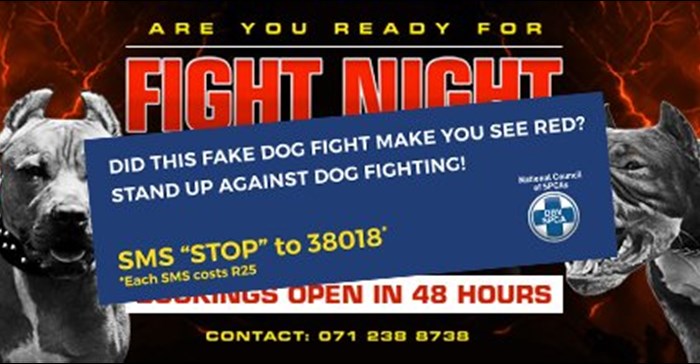





The NSPCA dogfighting campaign fell into that category. It was a gimmick masquerading as a campaign and it has generated a lot of community anger.

The gimmick featured a billboard using mobile media advertising towed around some locations in Johannesburg to advertise a fake dogfight, the objective being to stir up anger and channel that anger into action. The creative used a cage-fighting theme and the Mixed Martial Arts association was at one time accused of being behind the gimmick.
Our role as marketing communicators is to spread ideas. In this case, to spread the idea that dog fighting is a growing problem that transcends socio-economic status and to alert people to act if they notice the signs of underground dog fights. The mechanism used was to make people angry and then drive them from passive activism to actually doing something, reporting or donating money.
The first question was, whom was it designed to anger? The people who already support the NSPCA and who would care that someone is advertising a dog fight? They are the people who would – and did – get angry. People who don't care would still not care and do nothing.
It was a major failure in execution not to have the telephone number and website active at launch. Unfortunately, many people went to a lot of trouble and wasted a lot of time and emotion to find the organisers behind the event and bring them to book, some even went as far as to threaten the driver of the vehicle with assault. Many of them are angry that they were duped: Even when they contact the NSPCA, instead of revealing the campaign they were told that the event was “being investigated”. Judging from reactions, many people are angry that they were tricked. It’s never a good idea to alienate your supporters.
The #DogFighting @NSPCA_SA shock campaign is poorly executed, click-bait. It's neither clever not will the real message be remembered!
— Andrew Ross (@maddog_sa) June 27, 2016
That’s where the expression “cry wolf” comes from.
The next question is whether it was designed to create a conversation. The conversation I was able to find was about the campaign, not about dog fighting. That’s patently useless. We don't want people talking about the campaign, we want people talking about dogfighting.
Because it’s always easy to criticise campaigns, may I offer some suggestions of how it could have been improved? Starting from the brief, which was to raise awareness about illegal dogfighting. The budget was tiny.
In summary then, the dogfighting campaign represents a lost opportunity. It alienated the community it needs to have on its side, the conversation generated was not about the problem but about the campaign and unfortunately will, in my opinion, soon be forgotten.
*Note that Bizcommunity staff and management do not necessarily share the views of its contributors - the opinions and statements expressed herein are solely those of the author.*
